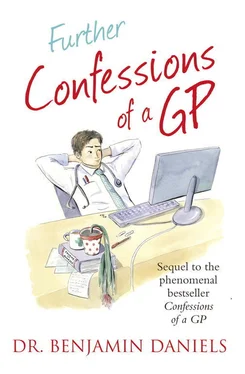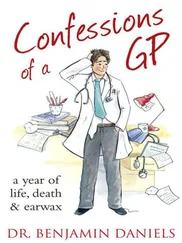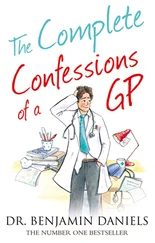We all worry about our health sometimes, but most of us have a sensible threshold as to when we need to seek medical help for our ailments. We are able to look rationally at our symptoms and decide how potentially serious they might be, and can usually reassure ourselves when they are obviously benign. Nathan doesn’t seem to possess this ability. He could be called a hypochondriac, although this seems a slightly crude, old-fashioned description. I would say he has health phobias. He has an irrational fixed fear about his health that often takes over his life and is very debilitating. When Nathan presents with yet another ailment, my gut reaction is to attempt to reassure him. He knows that he worries excessively, but his overwhelming health fears trigger a niggling doubt in me. Like the boy who cried wolf, perhaps at one point Nathan will genuinely have something wrong that needs treating and I’ll be the one that misses it.
Nathan and I became trapped in a folie à deux , in which he came to see me for reassurance and I encouraged his behaviour by offering him a test that gave him a brief respite from his fears when the result come back as normal. Round and round we went, but I decided it was going to stop today.
‘Nathan, you don’t need an HIV test because you don’t have HIV. You’re a healthy 17-year-old lad and you need to stop worrying about your health.’
‘I reckon I’d just stop worrying if you gave me an HIV test.’
‘I’m going to refer you to a therapist. To address your excessive health concerns. You need help to find ways to stop worrying about your health so much.’
Nathan looked at me blankly and then quietly left my room. He didn’t ever go to see the therapist I referred him to, but instead went and got an HIV test from the walk-in sexual health clinic. I guess that I ultimately failed in my plan to break the cycle, but on a more positive note Nathan does seem to be coming in to see me less frequently. Perhaps he’s better at dealing with his health phobias. Or perhaps he’s just given up on me and is sitting at home terrified that he is about to die from the latest of his perceived ailments.
It was a year after I had completed the army medical for Lee. He still looked like a young boy, but something had changed in him.
‘I’m due to go back for my second tour in Helmand, Dr Daniels, but I don’t want to go. Can you write something to say I can’t go back?’
‘I guess I can try. Was it really bad out there?’
‘It was terrible. All my friends back here keep asking me is if I killed anyone. I don’t even think I ever saw a Taliban to shoot at, let alone kill. All I saw on patrol were kids and women and old people, but every step you’re wondering if a sniper is going to get you. Every time you see a kid you wonder if they’re going to blow themselves up. They look at you like you’re scum and the women shout at us in their language and spit at us. Being in the vehicles was even worse. Imagine being in a vehicle that gets blown up by an IED [improvised explosive device] and catches fire. You either stay inside and burn or you try to get out and a sniper shoots you.’
He went on: ‘My mates think it sounds exciting, but I was scared the whole time even though most of the time nothing happens at all. Even during down time I couldn’t relax. All the worrying made me ill. My bowels were all over the place and I barely slept. Some of the other guys in the battalion took the piss out of me, but I know they were scared as well. I just can’t go back there. Since I’ve been back I’m just angry all the time. Please don’t make me go back.’
‘Lee, I can try writing something, but ultimately it’s the army doctors who get to decide, not me.’
I wrote a long letter stating that I believed Lee had post-traumatic stress disorder. They might dismiss it outright given that Lee hadn’t really even seen much action, but he did have all the symptoms. He couldn’t sleep, was having flashbacks and experiencing continually high levels of anxiety.
Lee was worried that I would think him a coward, but the thought didn’t cross my mind. I’ve never been in the situation where my levels of bravery have been tested. Who knows how I’d cope in the environment of frontline Afghanistan, never being able to close your eyes and go to sleep without a little part of your brain knowing that a rocket could come flying through the window or a Taliban disguised as a police officer could shoot you while you slept. Why some people cope in that situation and others don’t, I’m not sure, but Lee was my patient and he wasn’t faring well. My letter concluded with the statement that I thought Lee was not safe for frontline duties and could be a danger to himself and his battalion. I hoped the army might believe me and give Lee a medical discharge.
Lee didn’t have to wait to find out if the army would discharge him on medical grounds. He got into a fight with some local lads in the town centre and his punch put a 16-year-old boy in intensive care. He is on remand and looking at a likely one-year stretch in prison. I haven’t seen him since, but his mum’s optimism about him going into the army to keep him out of trouble seems a sad irony now.
I was working in A&E again. As I arrived for my shift my heart sank as I spotted the queue of ambulances sat at the entrance. Each paramedic crew was patiently waiting to offload their patient into a department that was already completely full. Barry was in charge today, and he was looking very flustered as he tried to move trolleys in and out of cubicles in a gallant attempt to make space when there was none. The phones were all ringing at once and it felt like a scene from a disaster movie.
At times like this, each new patient being brought in feels like an extra mouth to feed when there is already not enough food to go round. The doctors and nurses collectively groan as they witness each new admission being wheeled in. The poor patient sitting on the ambulance trolley needs help, time and care, but this can often be lost when the staff are in such a flap simply trying to manage the impossible task of fitting 50 patients into a department with 30 beds.
‘There’s a bed crisis,’ one of the nurses mouthed to me as if to try to explain the madness that I was walking into. There was a time when a bed crisis was considered to be a rare, traumatic event, but now we just seemed to run on the assumption that there was always a bed crisis, which makes the phrase meaningless.
Fortunately for me, I wasn’t responsible for managing the bed issue. I was simply there as a foot soldier. My job was to see and treat the patients as effectively and efficiently as I could. I blanked out the noise and chaos and picked up the medical notes of the next patient to be seen. To my surprise it was a patient I knew very well and, if I’m honest, was probably my favourite patient at my practice. One of the odd perks of being both a GP and an occasional A&E doctor is that I sometimes meet my primary care regulars when they have an emergency and end up in casualty.
Betty was a great character, well known to all the staff at my practice. She had a loud cackling laugh and called everyone ‘darling’. She made sure to buy the practice a bottle of sherry every Christmas and would flirt outrageously with any man aged between 16 and 100. Betty had worked the boards as a cabaret performer for years and I loved visiting her flat and seeing the old black-and-white photos of her from the late 1940s looking glamorous. Her stage persona was Betty Ferrari, which sounds like the name of a drag act now, but back in the late 40s, she assures me, it was alluring and exotic. ‘I was married to the stage and I was monogamous!’ That was her way of telling me that she never settled down or had children. With no family, Betty was lonely. I visited as often as I could. If we had medical students attached to the surgery I would bring them to meet her. I told them she had an interesting medical history but the real reason for the visit was because she loved the company and revelled in performing a few of the ‘old numbers’ for a new audience. Unfortunately, these days her bad lungs mean she rarely finishes a song without being interrupted by a coughing fit.
Читать дальше
Конец ознакомительного отрывка
Купить книгу











![Benjamin Franklin - Memoirs of Benjamin Franklin; Written by Himself. [Vol. 2 of 2]](/books/747975/benjamin-franklin-memoirs-of-benjamin-franklin-wr-thumb.webp)
![Benjamin Franklin - Memoirs of Benjamin Franklin; Written by Himself. [Vol. 1 of 2]](/books/748053/benjamin-franklin-memoirs-of-benjamin-franklin-wr-thumb.webp)